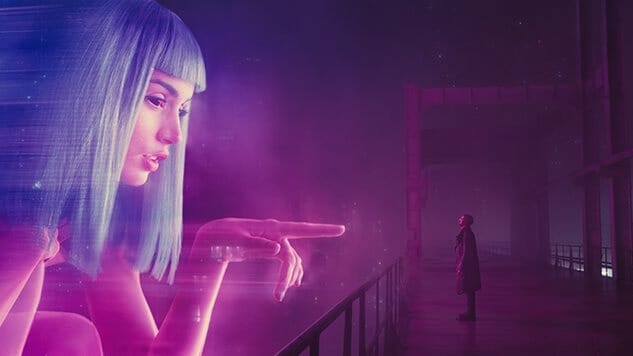Blade Runner 2049

Denis Villeneuve has gone out of his way to make sure that no spoilers escape early screenings of Blade Runner 2049, that every person seeing this—created, with a self-awareness that is very on brand, amidst the thickets of the Golden Age of Spoilers—goes in with the least amount of available information. And so: this is a sequel to 1982’s still-iconic Blade Runner, taking place almost 30 years later, starring Ryan Gosling as another titular android-hunting cop who seeks out the help of former blade runner Rick Deckard, because Harrison Ford is in this movie, which might have been a rewarding spoiler were Harrison Ford not all over previews and movie posters and interviews. He doesn’t enter the film until almost 100 minutes in.
Which is to say: The spoilers from which Villeneuve et al. are shielding you have very little to do with what an astounding achievement Blade Runner 2049 is, and even less to do with how the director has transformed the idea of a follow-up that nobody wanted into a coherent vision that both parallels and deepens the world Ridley Scott once extrapolated loosely from Philip K. Dick’s novel. What J.J. Abrams has and will do with the post-Lucas Star Wars universe is only half of what Villeneuve has done, explaining the director’s obsessive struggle for control over even what you, audience member, are willing to ruin for yourself, because past the very real themes of control his movie explores, Villeneuve is attempting to craft an auteurist franchise sequel, something closer to the Mission: Impossible serials than the Kathleen Kennedy paint-by-committee behemoth. Maybe that’s way overqualified praise, but Blade Runner 2049 should resonate deeply with anyone who’s ever held love for the original.
Scott’s Blade Runner ends right before—in the lore of this shitty future world, which is available in plenty of ancillary short films and material online—a world-ending disaster which exacerbates the ecological peril under which humans already live, essentially “rebooting” (sigh) society. In 2049, humans apparently have a much more locked-down relationship with Replicants (bio-engineered, super-strong humanoids which, as the previous film taught us, were mostly indistinguishable from humans, given implanted memories, even, to close that Uncanny Valley as much as possible), but that doesn’t mean there still aren’t the last dregs of Nexus 8s (the last unregulated Replicants, built by the Tyrell Corporation before the blackout) hiding out, avoiding “retirement.” The Wallace Corporation, started by bajillionaire quasi-mystical cardboard cut-out Niander Wallace (Jared Leto, Jared-Leto-ing all over the floor), pioneered synthetic food, solving the world’s famine problem, making the company rich enough to acquire whatever was left of the Tyrell Corporation to reinstitute the Replicant program, because if there’s anything human beings can’t let go, it’s slavery.
Enter Officer K (Gosling), a sexy, stoic blade runner who we meet moments before he disposes of one of those old Nexus 8 models, played with bittersweet fatality by Dave Bautista, because Dave Bautista is the fucking best. The audience is shown, gracefully it’s worth noting, that K is a Replicant, and the reasoning is valid: There’s no one better to hunt down Replicants than one of their own. In the sense that Villeneuve is adhering to some of the same neo-noir elements as Scott once did, K is a strange anti-hero to have at the core of this chiaroscuro world, because he ostensibly has no choice, no say in his destiny, and accepts that reality as an ineluctable fact. Arguably, what he knows of the world is only made clearer by the end of the film, a bleak result he accepts not because the veil has been pulled away, as is the case in most noir, but because he has no ultimate choice. And unlike Rachel (Sean Young) in Scott’s original, there is no femme fatale who pulls K to the dark side; instead, Villeneuve trades in noir tropes for the relationship behind those tropes, and behind Deckard’s attraction to Rachel. K falls in love, which, just as was the case in the 1982 film, questions the nature of the emotion as complicatedly as those who hold it. Who’s to say what isn’t love when you are not the entity experiencing it, defining it—as humans do—from within.
So Villeneuve is pondering similar questions as his progenitor, posing them to the audience in similar environs, within similar genres, ditching some of the mystery surrounding Deckard’s humanity as implied in Scott’s film to more intimately litigate the non-mystery surrounding K’s. Blade Runner 2049 is a film about the difference between creation and birth, if there really is one, but it boils that difference down even further into issues of control: Do we, in fact, sedately claim our humanity because we indulge in the illusion of control, or do we actually have control, and therefore are human? K tells his superior (Robin Wright, slight) that he knows his memories aren’t real, but that knowledge hardly seems to matter. One senses that K might prefer the ignorance of a Replicant like Rachel, someone who, sitting before Deckard’s Voigt-Kampff machine 30-something years earlier, assumed she was just as organic as the man asking her about butterfly jars. When K finally meets up with Deckard, the haggard detective has a haggard dog—K asks if the dog is real (because most non-human “life” in this world is synthetic), to which Deckard smirks, “I don’t know. You should ask him.”
-

-

-

-

-

-

-

-

-

-

-

-

-

-

-

-

-

-

-

-

-

-

-

-

-

-

-

-

-

-

-

-

-

-

-

-

-

-

-

-








































